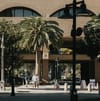Drone Crackdown on Illegal Fireworks Yields 65 Citations, $97,500 in Fines
New aerial surveillance program shows mixed results across neighborhoods as complaints increase.
Riverside Councilmembers took steps that may lead to legalization of cannabis dispensaries in the city by the end of 2022.

Members of the City Council took the first steps toward allowing cannabis dispensaries to operate within the City of Riverside by the end of 2022 during a meeting Thursday afternoon.
Councilmembers Ronaldo Fierro, Erin Edwards and Steve Hemenway of the Economic Development, Placemaking, and Branding/Marketing Committee heard staff reports outlining different paths toward allowing up to 14 licenses for legal retail storefronts and curbside distribution of cannabis in the city. Manufacturing and cultivation of marijuana plants, other than what is currently allowed for personal use, would still be prohibited.
The committee is also planning to prepare a city-wide ballot measure on the matter in the 2024 General Election. The move comes amid concerns that a cannabis-industry sponsored ballot initiative, currently gathering signatures, could, if passed, impose a slate of regulations on local cannabis businesses without city government or community input.
Staff presented a series of proposed changes to city municipal codes on business taxes, zoning, and public safety, which will be submitted to the council in draft form in May 2022. Public engagement and outreach will be sought throughout the process. Plans should be finalized by November 2022, and if approved by the council, will take effect in February 2023.
Fierro, committee chair and one of the proponents of the move, said “Riverside currently has some of the negative impacts of the cannabis industry, without the positives,” such as revenue from taxes and fees.
Councilmember Erin Edwards, who serves Ward 1, asked for estimates on tax revenue. In response, David McPherson, of HdL Companies, a consultant group which provides cannabis compliance services for Riverside and other Southern California cities, said that gross annual revenue is estimated at $35-40 million, with the city’s share in the 3-6 percent range.
Public comments were mostly supportive of the proposed change to the municipal codes, seeing opportunities for good local jobs and money for affordable housing. However, Andrew Sall, manager of governmental affairs at the Greater Riverside Chambers of Commerce, cautioned that increased cannabis dollars could also increase costs in public safety and social services, primarily law enforcement.
In addition to fees and local taxes, the city plan would require cannabis businesses to contribute to a fund for community projects, though no details were provided at the meeting.
Let us email you Riverside's news and events every morning. For free!